Report on Factors Influencing Medication Adherence in Bipolar Disorder
VerifiedAdded on 2023/06/04
|11
|1817
|354
Report
AI Summary
This report investigates the issue of medication non-adherence among adult patients diagnosed with bipolar disorder, examining whether long-acting injectable medications administered every four weeks lead to better patient outcomes and treatment compliance compared to oral medications. The analysis is based on a review of eight research articles, identified through a PRISMA guideline-based search process, encompassing cross-sectional, quasi-experimental, and qualitative studies. The findings suggest that various factors, including patient perceptions, medication burden, dose timing, and complex medication regimens, significantly influence adherence, regardless of whether medications are administered orally or via injection. The report highlights the need to address these factors to improve medication adherence rates and enhance recovery outcomes for individuals with bipolar disorder.
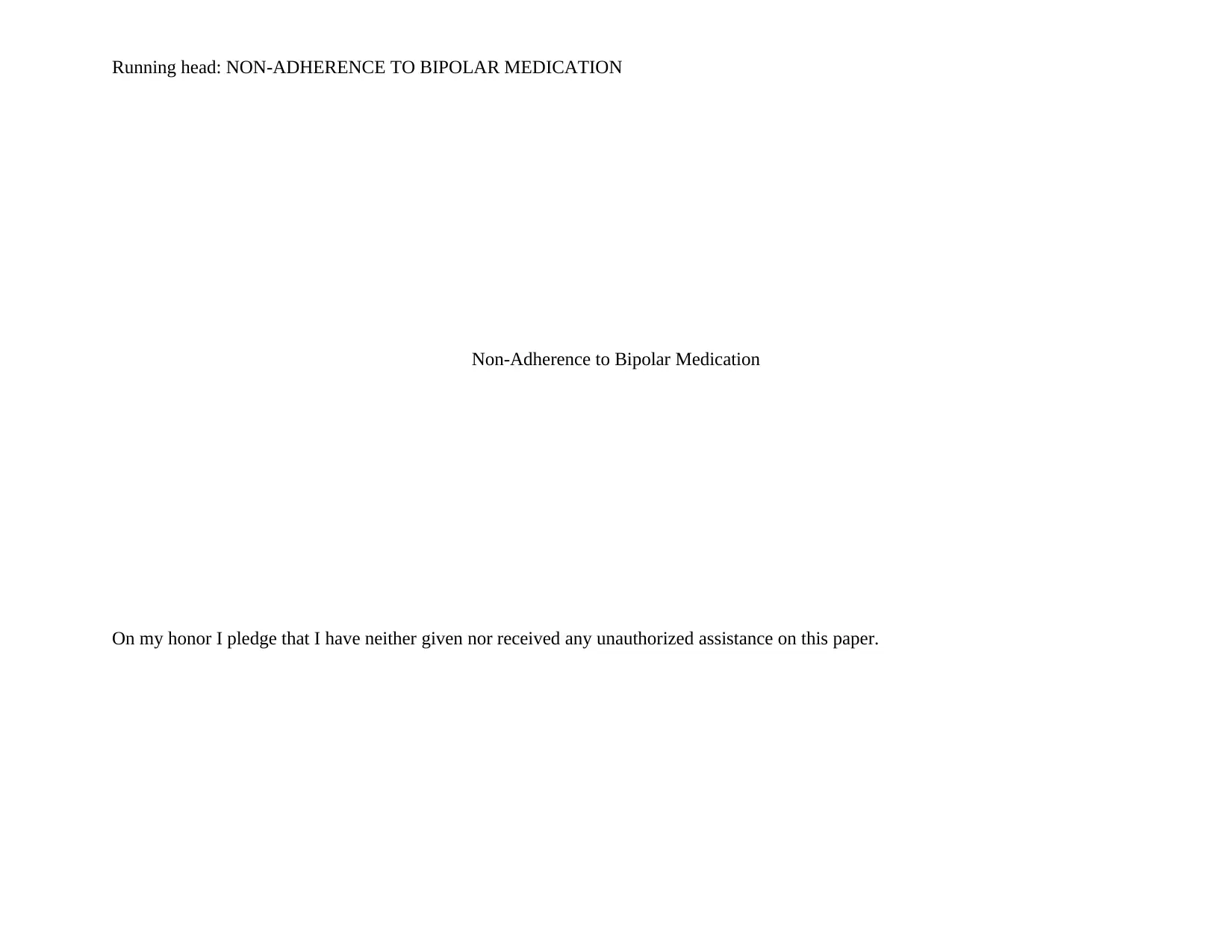
Running head: NON-ADHERENCE TO BIPOLAR MEDICATION
Non-Adherence to Bipolar Medication
On my honor I pledge that I have neither given nor received any unauthorized assistance on this paper.
Non-Adherence to Bipolar Medication
On my honor I pledge that I have neither given nor received any unauthorized assistance on this paper.
Paraphrase This Document
Need a fresh take? Get an instant paraphrase of this document with our AI Paraphraser
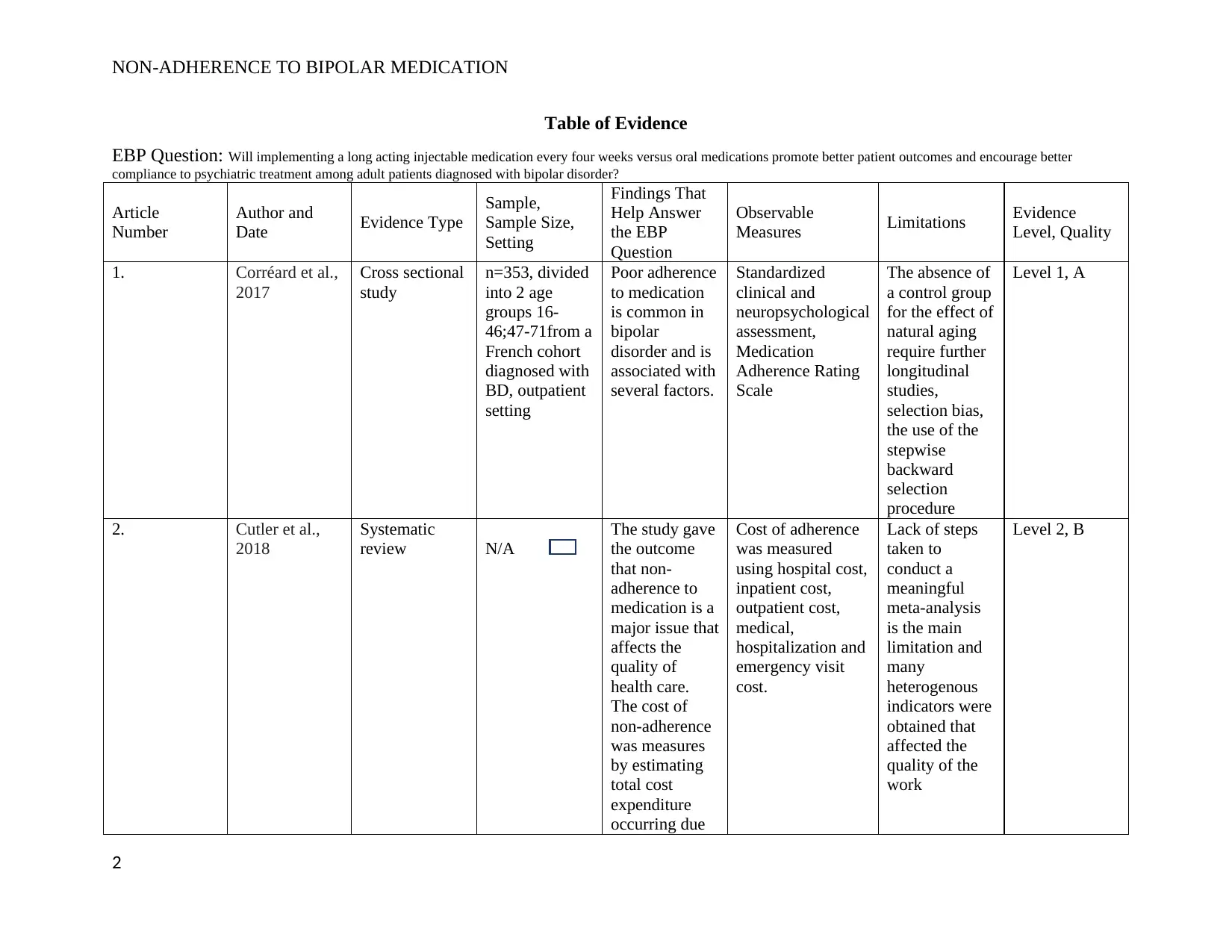
NON-ADHERENCE TO BIPOLAR MEDICATION
Table of Evidence
EBP Question: Will implementing a long acting injectable medication every four weeks versus oral medications promote better patient outcomes and encourage better
compliance to psychiatric treatment among adult patients diagnosed with bipolar disorder?
Article
Number
Author and
Date Evidence Type
Sample,
Sample Size,
Setting
Findings That
Help Answer
the EBP
Question
Observable
Measures Limitations Evidence
Level, Quality
1. Corréard et al.,
2017
Cross sectional
study
n=353, divided
into 2 age
groups 16-
46;47-71from a
French cohort
diagnosed with
BD, outpatient
setting
Poor adherence
to medication
is common in
bipolar
disorder and is
associated with
several factors.
Standardized
clinical and
neuropsychological
assessment,
Medication
Adherence Rating
Scale
The absence of
a control group
for the effect of
natural aging
require further
longitudinal
studies,
selection bias,
the use of the
stepwise
backward
selection
procedure
Level 1, A
2. Cutler et al.,
2018
Systematic
review N/A
The study gave
the outcome
that non-
adherence to
medication is a
major issue that
affects the
quality of
health care.
The cost of
non-adherence
was measures
by estimating
total cost
expenditure
occurring due
Cost of adherence
was measured
using hospital cost,
inpatient cost,
outpatient cost,
medical,
hospitalization and
emergency visit
cost.
Lack of steps
taken to
conduct a
meaningful
meta-analysis
is the main
limitation and
many
heterogenous
indicators were
obtained that
affected the
quality of the
work
Level 2, B
2
Table of Evidence
EBP Question: Will implementing a long acting injectable medication every four weeks versus oral medications promote better patient outcomes and encourage better
compliance to psychiatric treatment among adult patients diagnosed with bipolar disorder?
Article
Number
Author and
Date Evidence Type
Sample,
Sample Size,
Setting
Findings That
Help Answer
the EBP
Question
Observable
Measures Limitations Evidence
Level, Quality
1. Corréard et al.,
2017
Cross sectional
study
n=353, divided
into 2 age
groups 16-
46;47-71from a
French cohort
diagnosed with
BD, outpatient
setting
Poor adherence
to medication
is common in
bipolar
disorder and is
associated with
several factors.
Standardized
clinical and
neuropsychological
assessment,
Medication
Adherence Rating
Scale
The absence of
a control group
for the effect of
natural aging
require further
longitudinal
studies,
selection bias,
the use of the
stepwise
backward
selection
procedure
Level 1, A
2. Cutler et al.,
2018
Systematic
review N/A
The study gave
the outcome
that non-
adherence to
medication is a
major issue that
affects the
quality of
health care.
The cost of
non-adherence
was measures
by estimating
total cost
expenditure
occurring due
Cost of adherence
was measured
using hospital cost,
inpatient cost,
outpatient cost,
medical,
hospitalization and
emergency visit
cost.
Lack of steps
taken to
conduct a
meaningful
meta-analysis
is the main
limitation and
many
heterogenous
indicators were
obtained that
affected the
quality of the
work
Level 2, B
2
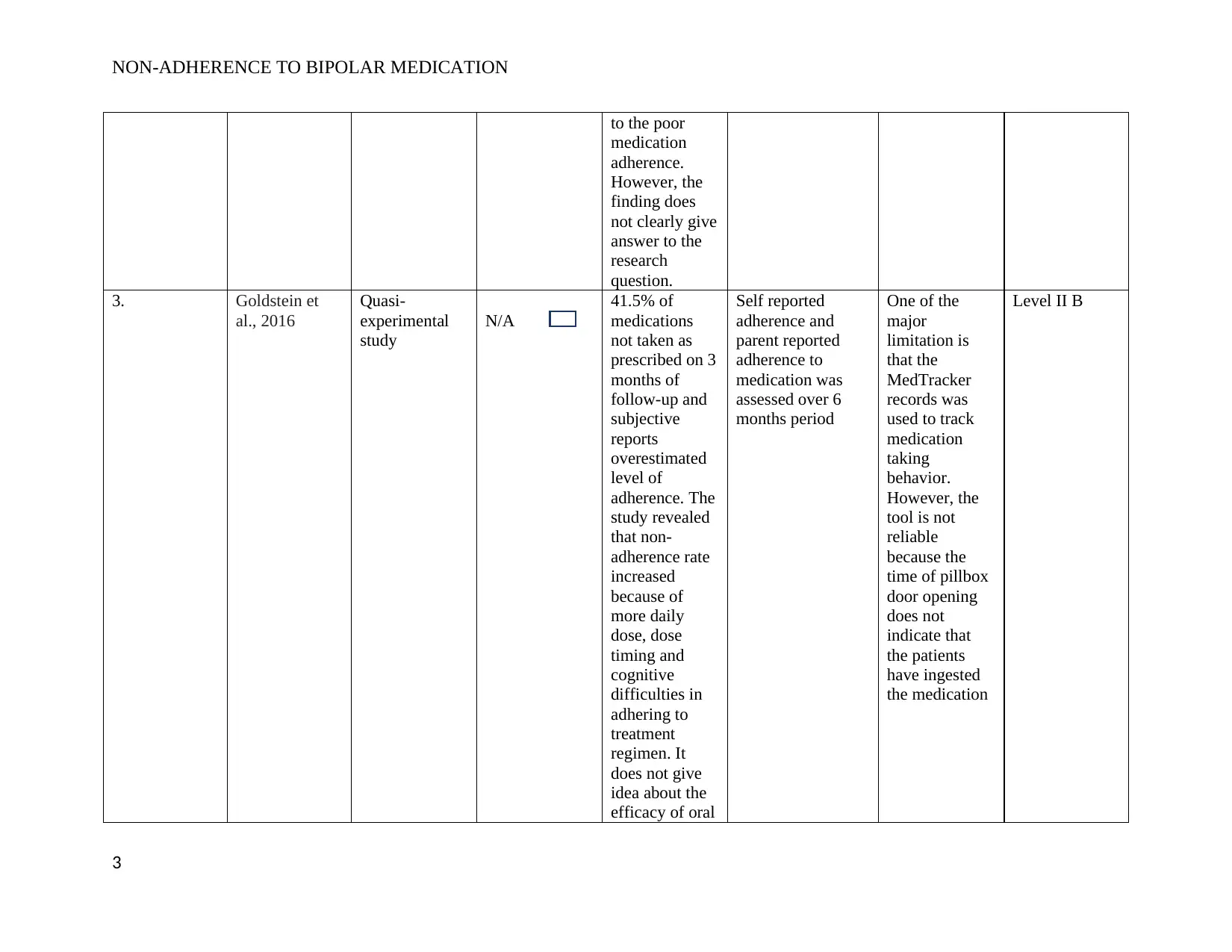
NON-ADHERENCE TO BIPOLAR MEDICATION
to the poor
medication
adherence.
However, the
finding does
not clearly give
answer to the
research
question.
3. Goldstein et
al., 2016
Quasi-
experimental
study
N/A
41.5% of
medications
not taken as
prescribed on 3
months of
follow-up and
subjective
reports
overestimated
level of
adherence. The
study revealed
that non-
adherence rate
increased
because of
more daily
dose, dose
timing and
cognitive
difficulties in
adhering to
treatment
regimen. It
does not give
idea about the
efficacy of oral
Self reported
adherence and
parent reported
adherence to
medication was
assessed over 6
months period
One of the
major
limitation is
that the
MedTracker
records was
used to track
medication
taking
behavior.
However, the
tool is not
reliable
because the
time of pillbox
door opening
does not
indicate that
the patients
have ingested
the medication
Level II B
3
to the poor
medication
adherence.
However, the
finding does
not clearly give
answer to the
research
question.
3. Goldstein et
al., 2016
Quasi-
experimental
study
N/A
41.5% of
medications
not taken as
prescribed on 3
months of
follow-up and
subjective
reports
overestimated
level of
adherence. The
study revealed
that non-
adherence rate
increased
because of
more daily
dose, dose
timing and
cognitive
difficulties in
adhering to
treatment
regimen. It
does not give
idea about the
efficacy of oral
Self reported
adherence and
parent reported
adherence to
medication was
assessed over 6
months period
One of the
major
limitation is
that the
MedTracker
records was
used to track
medication
taking
behavior.
However, the
tool is not
reliable
because the
time of pillbox
door opening
does not
indicate that
the patients
have ingested
the medication
Level II B
3
⊘ This is a preview!⊘
Do you want full access?
Subscribe today to unlock all pages.

Trusted by 1+ million students worldwide
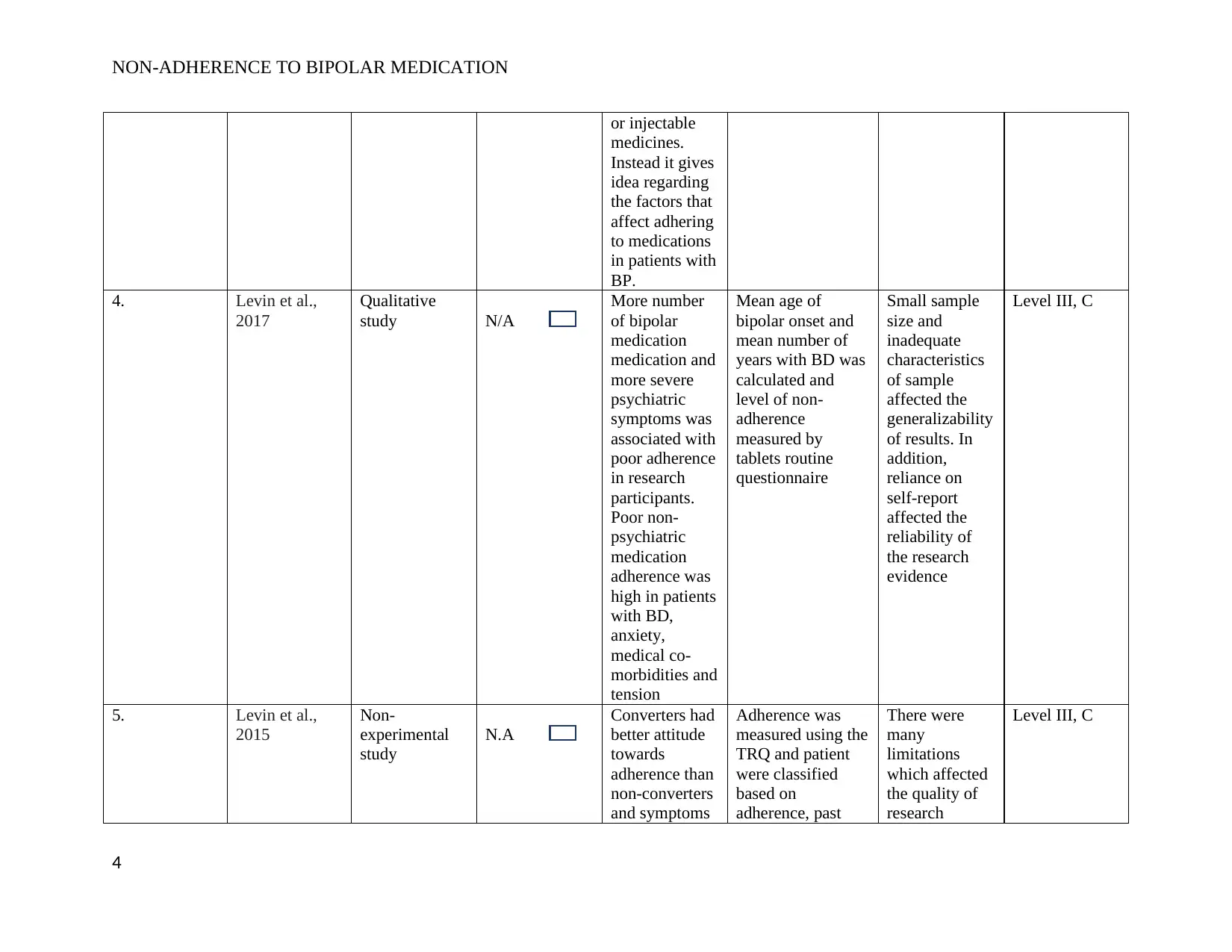
NON-ADHERENCE TO BIPOLAR MEDICATION
or injectable
medicines.
Instead it gives
idea regarding
the factors that
affect adhering
to medications
in patients with
BP.
4. Levin et al.,
2017
Qualitative
study N/A
More number
of bipolar
medication
medication and
more severe
psychiatric
symptoms was
associated with
poor adherence
in research
participants.
Poor non-
psychiatric
medication
adherence was
high in patients
with BD,
anxiety,
medical co-
morbidities and
tension
Mean age of
bipolar onset and
mean number of
years with BD was
calculated and
level of non-
adherence
measured by
tablets routine
questionnaire
Small sample
size and
inadequate
characteristics
of sample
affected the
generalizability
of results. In
addition,
reliance on
self-report
affected the
reliability of
the research
evidence
Level III, C
5. Levin et al.,
2015
Non-
experimental
study
N.A
Converters had
better attitude
towards
adherence than
non-converters
and symptoms
Adherence was
measured using the
TRQ and patient
were classified
based on
adherence, past
There were
many
limitations
which affected
the quality of
research
Level III, C
4
or injectable
medicines.
Instead it gives
idea regarding
the factors that
affect adhering
to medications
in patients with
BP.
4. Levin et al.,
2017
Qualitative
study N/A
More number
of bipolar
medication
medication and
more severe
psychiatric
symptoms was
associated with
poor adherence
in research
participants.
Poor non-
psychiatric
medication
adherence was
high in patients
with BD,
anxiety,
medical co-
morbidities and
tension
Mean age of
bipolar onset and
mean number of
years with BD was
calculated and
level of non-
adherence
measured by
tablets routine
questionnaire
Small sample
size and
inadequate
characteristics
of sample
affected the
generalizability
of results. In
addition,
reliance on
self-report
affected the
reliability of
the research
evidence
Level III, C
5. Levin et al.,
2015
Non-
experimental
study
N.A
Converters had
better attitude
towards
adherence than
non-converters
and symptoms
Adherence was
measured using the
TRQ and patient
were classified
based on
adherence, past
There were
many
limitations
which affected
the quality of
research
Level III, C
4
Paraphrase This Document
Need a fresh take? Get an instant paraphrase of this document with our AI Paraphraser
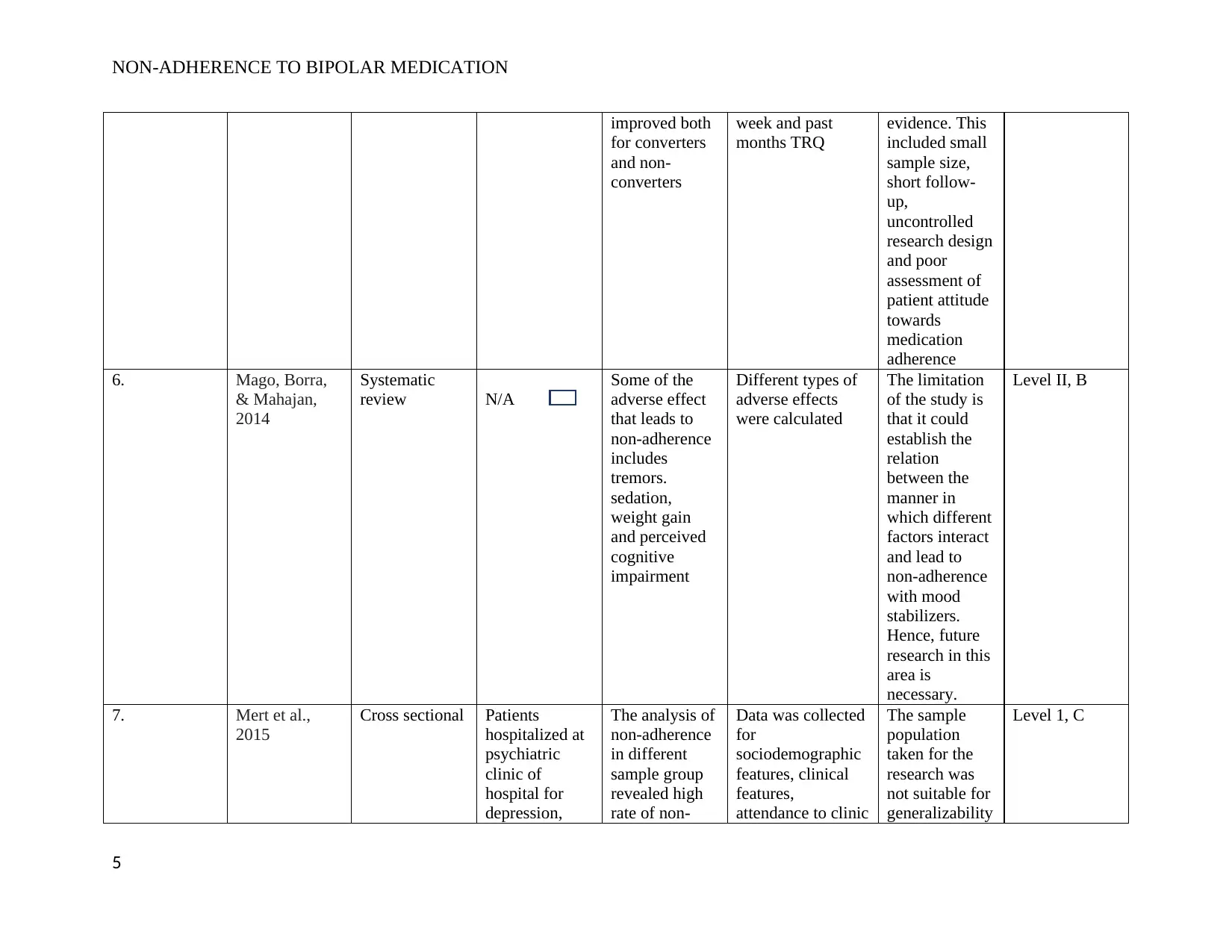
NON-ADHERENCE TO BIPOLAR MEDICATION
improved both
for converters
and non-
converters
week and past
months TRQ
evidence. This
included small
sample size,
short follow-
up,
uncontrolled
research design
and poor
assessment of
patient attitude
towards
medication
adherence
6. Mago, Borra,
& Mahajan,
2014
Systematic
review N/A
Some of the
adverse effect
that leads to
non-adherence
includes
tremors.
sedation,
weight gain
and perceived
cognitive
impairment
Different types of
adverse effects
were calculated
The limitation
of the study is
that it could
establish the
relation
between the
manner in
which different
factors interact
and lead to
non-adherence
with mood
stabilizers.
Hence, future
research in this
area is
necessary.
Level II, B
7. Mert et al.,
2015
Cross sectional Patients
hospitalized at
psychiatric
clinic of
hospital for
depression,
The analysis of
non-adherence
in different
sample group
revealed high
rate of non-
Data was collected
for
sociodemographic
features, clinical
features,
attendance to clinic
The sample
population
taken for the
research was
not suitable for
generalizability
Level 1, C
5
improved both
for converters
and non-
converters
week and past
months TRQ
evidence. This
included small
sample size,
short follow-
up,
uncontrolled
research design
and poor
assessment of
patient attitude
towards
medication
adherence
6. Mago, Borra,
& Mahajan,
2014
Systematic
review N/A
Some of the
adverse effect
that leads to
non-adherence
includes
tremors.
sedation,
weight gain
and perceived
cognitive
impairment
Different types of
adverse effects
were calculated
The limitation
of the study is
that it could
establish the
relation
between the
manner in
which different
factors interact
and lead to
non-adherence
with mood
stabilizers.
Hence, future
research in this
area is
necessary.
Level II, B
7. Mert et al.,
2015
Cross sectional Patients
hospitalized at
psychiatric
clinic of
hospital for
depression,
The analysis of
non-adherence
in different
sample group
revealed high
rate of non-
Data was collected
for
sociodemographic
features, clinical
features,
attendance to clinic
The sample
population
taken for the
research was
not suitable for
generalizability
Level 1, C
5
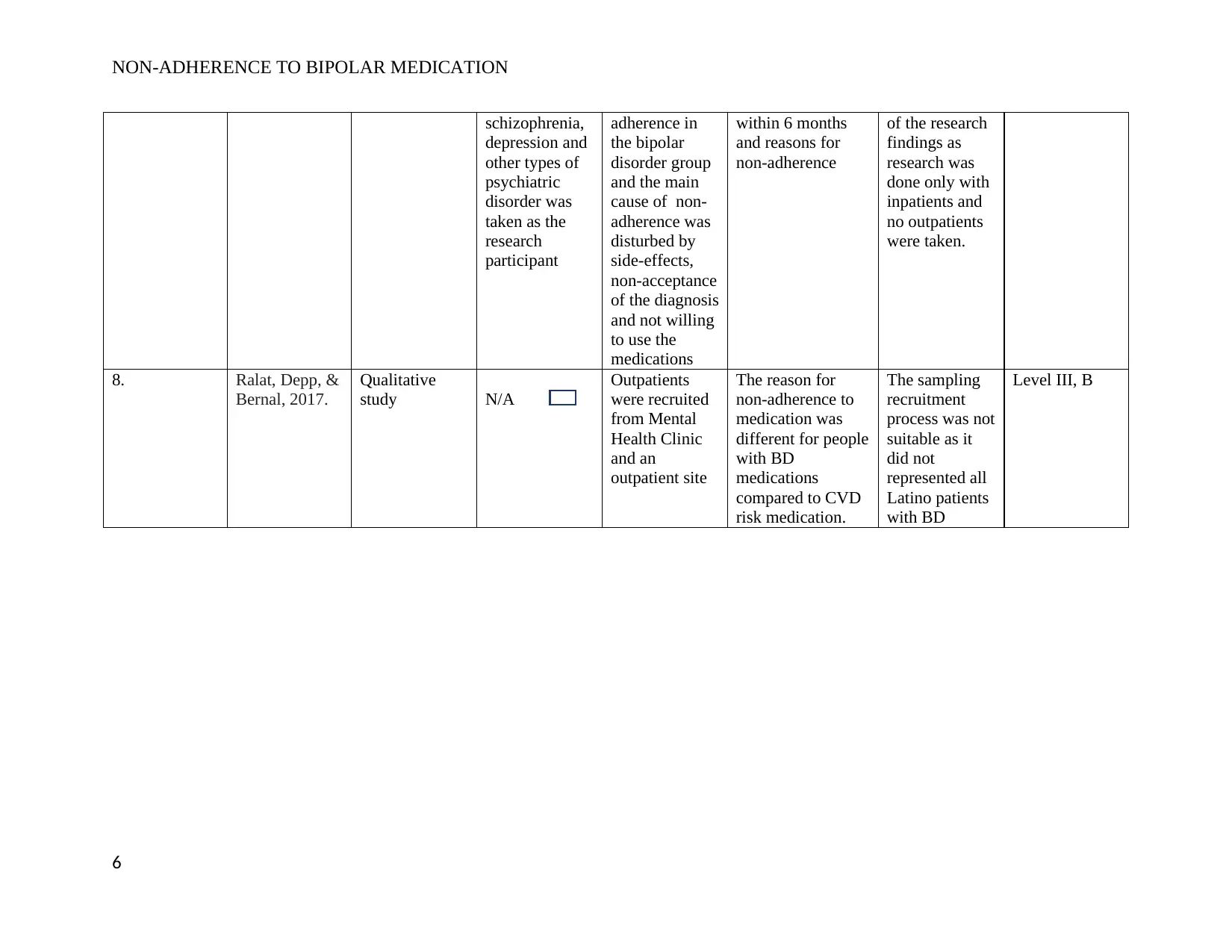
NON-ADHERENCE TO BIPOLAR MEDICATION
schizophrenia,
depression and
other types of
psychiatric
disorder was
taken as the
research
participant
adherence in
the bipolar
disorder group
and the main
cause of non-
adherence was
disturbed by
side-effects,
non-acceptance
of the diagnosis
and not willing
to use the
medications
within 6 months
and reasons for
non-adherence
of the research
findings as
research was
done only with
inpatients and
no outpatients
were taken.
8. Ralat, Depp, &
Bernal, 2017.
Qualitative
study N/A
Outpatients
were recruited
from Mental
Health Clinic
and an
outpatient site
The reason for
non-adherence to
medication was
different for people
with BD
medications
compared to CVD
risk medication.
The sampling
recruitment
process was not
suitable as it
did not
represented all
Latino patients
with BD
Level III, B
6
schizophrenia,
depression and
other types of
psychiatric
disorder was
taken as the
research
participant
adherence in
the bipolar
disorder group
and the main
cause of non-
adherence was
disturbed by
side-effects,
non-acceptance
of the diagnosis
and not willing
to use the
medications
within 6 months
and reasons for
non-adherence
of the research
findings as
research was
done only with
inpatients and
no outpatients
were taken.
8. Ralat, Depp, &
Bernal, 2017.
Qualitative
study N/A
Outpatients
were recruited
from Mental
Health Clinic
and an
outpatient site
The reason for
non-adherence to
medication was
different for people
with BD
medications
compared to CVD
risk medication.
The sampling
recruitment
process was not
suitable as it
did not
represented all
Latino patients
with BD
Level III, B
6
⊘ This is a preview!⊘
Do you want full access?
Subscribe today to unlock all pages.

Trusted by 1+ million students worldwide
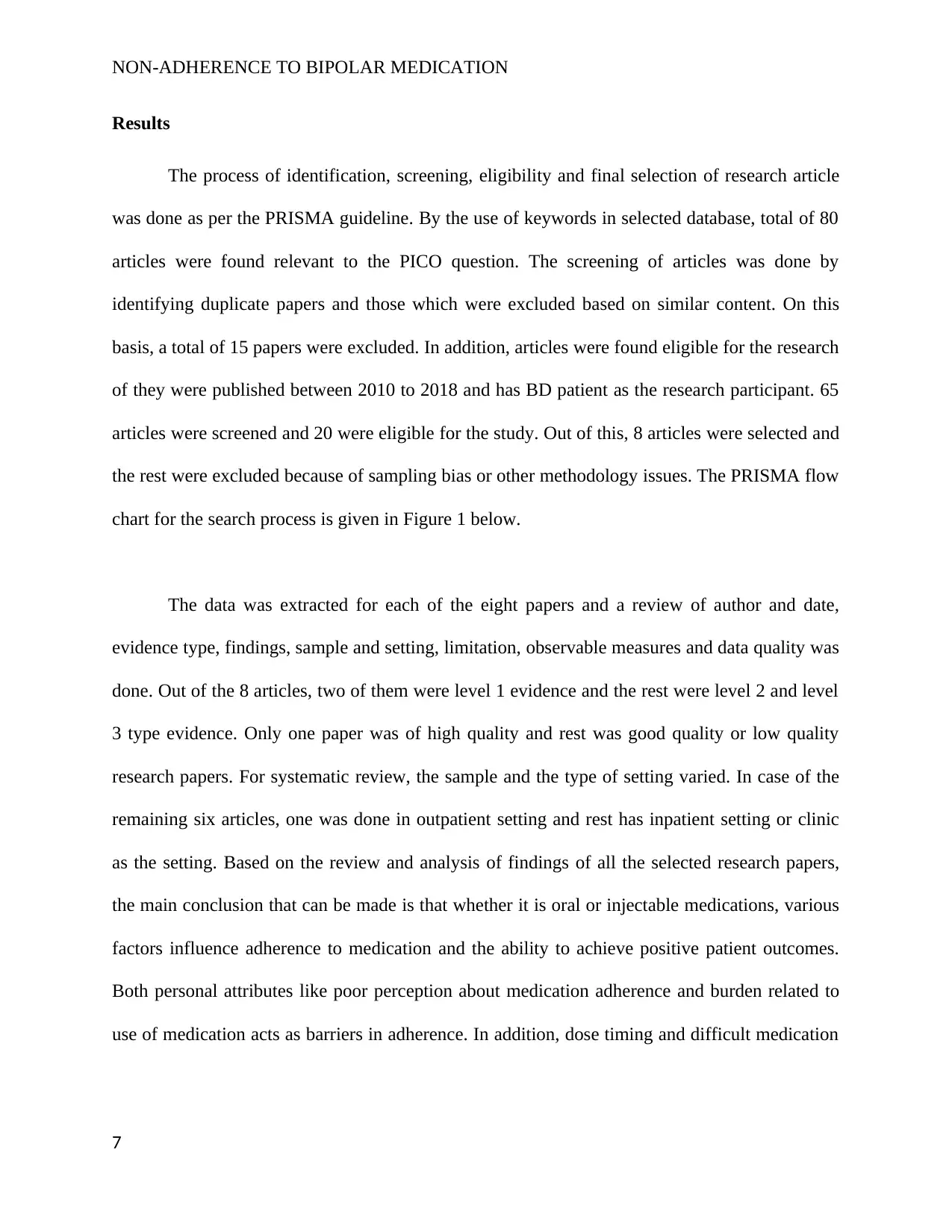
NON-ADHERENCE TO BIPOLAR MEDICATION
Results
The process of identification, screening, eligibility and final selection of research article
was done as per the PRISMA guideline. By the use of keywords in selected database, total of 80
articles were found relevant to the PICO question. The screening of articles was done by
identifying duplicate papers and those which were excluded based on similar content. On this
basis, a total of 15 papers were excluded. In addition, articles were found eligible for the research
of they were published between 2010 to 2018 and has BD patient as the research participant. 65
articles were screened and 20 were eligible for the study. Out of this, 8 articles were selected and
the rest were excluded because of sampling bias or other methodology issues. The PRISMA flow
chart for the search process is given in Figure 1 below.
The data was extracted for each of the eight papers and a review of author and date,
evidence type, findings, sample and setting, limitation, observable measures and data quality was
done. Out of the 8 articles, two of them were level 1 evidence and the rest were level 2 and level
3 type evidence. Only one paper was of high quality and rest was good quality or low quality
research papers. For systematic review, the sample and the type of setting varied. In case of the
remaining six articles, one was done in outpatient setting and rest has inpatient setting or clinic
as the setting. Based on the review and analysis of findings of all the selected research papers,
the main conclusion that can be made is that whether it is oral or injectable medications, various
factors influence adherence to medication and the ability to achieve positive patient outcomes.
Both personal attributes like poor perception about medication adherence and burden related to
use of medication acts as barriers in adherence. In addition, dose timing and difficult medication
7
Results
The process of identification, screening, eligibility and final selection of research article
was done as per the PRISMA guideline. By the use of keywords in selected database, total of 80
articles were found relevant to the PICO question. The screening of articles was done by
identifying duplicate papers and those which were excluded based on similar content. On this
basis, a total of 15 papers were excluded. In addition, articles were found eligible for the research
of they were published between 2010 to 2018 and has BD patient as the research participant. 65
articles were screened and 20 were eligible for the study. Out of this, 8 articles were selected and
the rest were excluded because of sampling bias or other methodology issues. The PRISMA flow
chart for the search process is given in Figure 1 below.
The data was extracted for each of the eight papers and a review of author and date,
evidence type, findings, sample and setting, limitation, observable measures and data quality was
done. Out of the 8 articles, two of them were level 1 evidence and the rest were level 2 and level
3 type evidence. Only one paper was of high quality and rest was good quality or low quality
research papers. For systematic review, the sample and the type of setting varied. In case of the
remaining six articles, one was done in outpatient setting and rest has inpatient setting or clinic
as the setting. Based on the review and analysis of findings of all the selected research papers,
the main conclusion that can be made is that whether it is oral or injectable medications, various
factors influence adherence to medication and the ability to achieve positive patient outcomes.
Both personal attributes like poor perception about medication adherence and burden related to
use of medication acts as barriers in adherence. In addition, dose timing and difficult medication
7
Paraphrase This Document
Need a fresh take? Get an instant paraphrase of this document with our AI Paraphraser

NON-ADHERENCE TO BIPOLAR MEDICATION
regimen also resulted in many challenges to adherence. Hence, these issues need to be addressed
to promote medication adherence and enhance the rate of recovery of BD patients.
8
regimen also resulted in many challenges to adherence. Hence, these issues need to be addressed
to promote medication adherence and enhance the rate of recovery of BD patients.
8
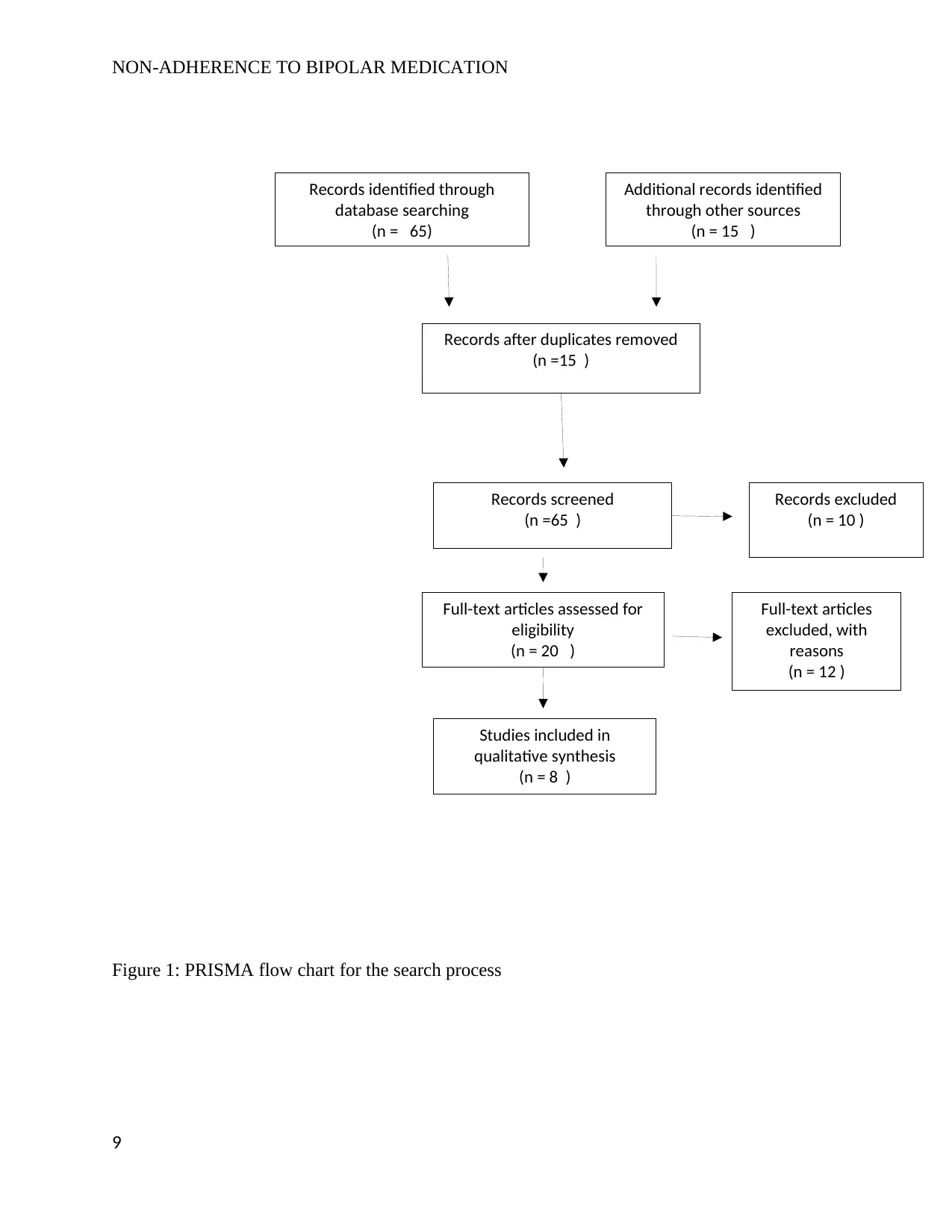
Records identified through
database searching
(n = 65)
Additional records identified
through other sources
(n = 15 )
Records after duplicates removed
(n =15 )
Records screened
(n =65 )
Records excluded
(n = 10 )
Full-text articles assessed for
eligibility
(n = 20 )
Studies included in
qualitative synthesis
(n = 8 )
Full-text articles
excluded, with
reasons
(n = 12 )
NON-ADHERENCE TO BIPOLAR MEDICATION
Figure 1: PRISMA flow chart for the search process
9
database searching
(n = 65)
Additional records identified
through other sources
(n = 15 )
Records after duplicates removed
(n =15 )
Records screened
(n =65 )
Records excluded
(n = 10 )
Full-text articles assessed for
eligibility
(n = 20 )
Studies included in
qualitative synthesis
(n = 8 )
Full-text articles
excluded, with
reasons
(n = 12 )
NON-ADHERENCE TO BIPOLAR MEDICATION
Figure 1: PRISMA flow chart for the search process
9
⊘ This is a preview!⊘
Do you want full access?
Subscribe today to unlock all pages.

Trusted by 1+ million students worldwide
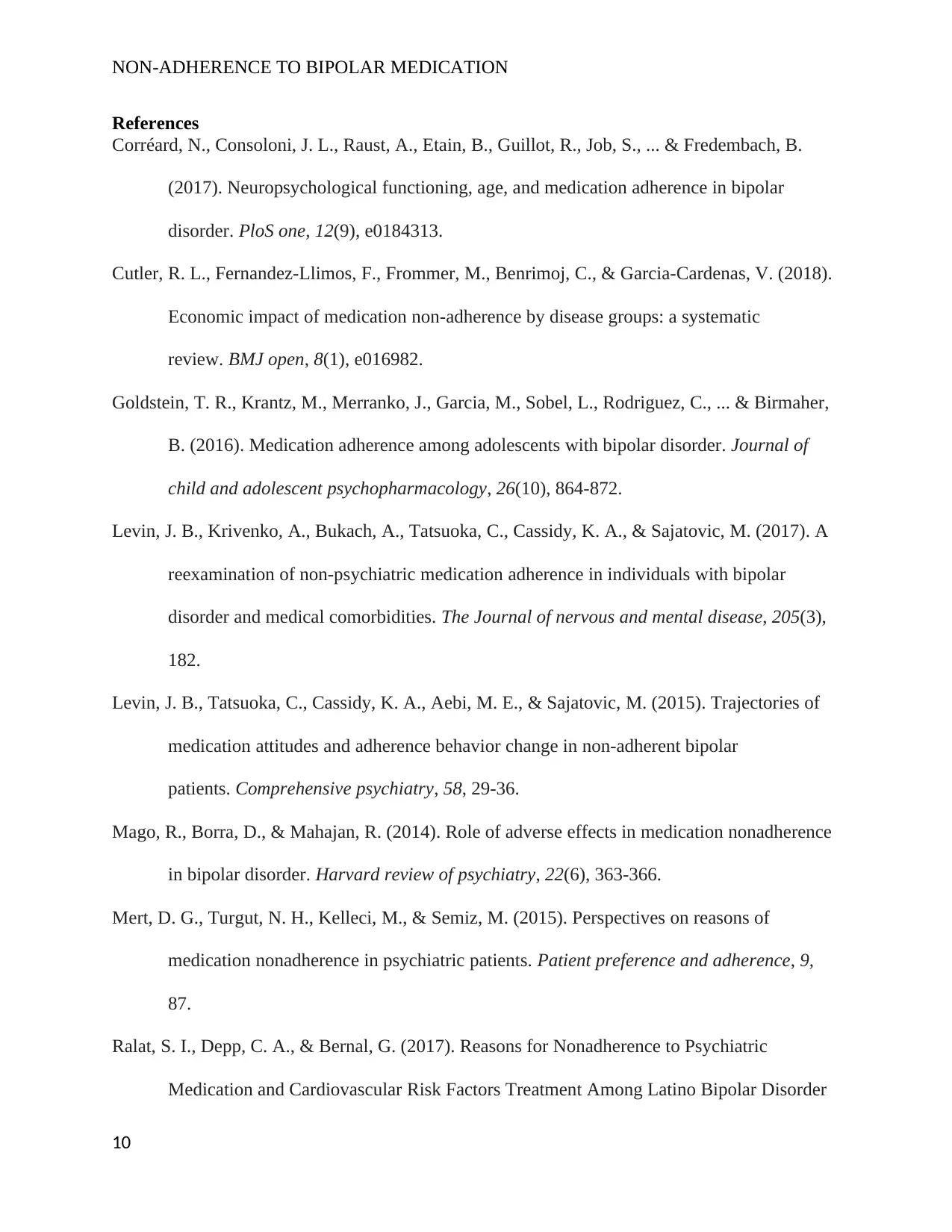
NON-ADHERENCE TO BIPOLAR MEDICATION
References
Corréard, N., Consoloni, J. L., Raust, A., Etain, B., Guillot, R., Job, S., ... & Fredembach, B.
(2017). Neuropsychological functioning, age, and medication adherence in bipolar
disorder. PloS one, 12(9), e0184313.
Cutler, R. L., Fernandez-Llimos, F., Frommer, M., Benrimoj, C., & Garcia-Cardenas, V. (2018).
Economic impact of medication non-adherence by disease groups: a systematic
review. BMJ open, 8(1), e016982.
Goldstein, T. R., Krantz, M., Merranko, J., Garcia, M., Sobel, L., Rodriguez, C., ... & Birmaher,
B. (2016). Medication adherence among adolescents with bipolar disorder. Journal of
child and adolescent psychopharmacology, 26(10), 864-872.
Levin, J. B., Krivenko, A., Bukach, A., Tatsuoka, C., Cassidy, K. A., & Sajatovic, M. (2017). A
reexamination of non-psychiatric medication adherence in individuals with bipolar
disorder and medical comorbidities. The Journal of nervous and mental disease, 205(3),
182.
Levin, J. B., Tatsuoka, C., Cassidy, K. A., Aebi, M. E., & Sajatovic, M. (2015). Trajectories of
medication attitudes and adherence behavior change in non-adherent bipolar
patients. Comprehensive psychiatry, 58, 29-36.
Mago, R., Borra, D., & Mahajan, R. (2014). Role of adverse effects in medication nonadherence
in bipolar disorder. Harvard review of psychiatry, 22(6), 363-366.
Mert, D. G., Turgut, N. H., Kelleci, M., & Semiz, M. (2015). Perspectives on reasons of
medication nonadherence in psychiatric patients. Patient preference and adherence, 9,
87.
Ralat, S. I., Depp, C. A., & Bernal, G. (2017). Reasons for Nonadherence to Psychiatric
Medication and Cardiovascular Risk Factors Treatment Among Latino Bipolar Disorder
10
References
Corréard, N., Consoloni, J. L., Raust, A., Etain, B., Guillot, R., Job, S., ... & Fredembach, B.
(2017). Neuropsychological functioning, age, and medication adherence in bipolar
disorder. PloS one, 12(9), e0184313.
Cutler, R. L., Fernandez-Llimos, F., Frommer, M., Benrimoj, C., & Garcia-Cardenas, V. (2018).
Economic impact of medication non-adherence by disease groups: a systematic
review. BMJ open, 8(1), e016982.
Goldstein, T. R., Krantz, M., Merranko, J., Garcia, M., Sobel, L., Rodriguez, C., ... & Birmaher,
B. (2016). Medication adherence among adolescents with bipolar disorder. Journal of
child and adolescent psychopharmacology, 26(10), 864-872.
Levin, J. B., Krivenko, A., Bukach, A., Tatsuoka, C., Cassidy, K. A., & Sajatovic, M. (2017). A
reexamination of non-psychiatric medication adherence in individuals with bipolar
disorder and medical comorbidities. The Journal of nervous and mental disease, 205(3),
182.
Levin, J. B., Tatsuoka, C., Cassidy, K. A., Aebi, M. E., & Sajatovic, M. (2015). Trajectories of
medication attitudes and adherence behavior change in non-adherent bipolar
patients. Comprehensive psychiatry, 58, 29-36.
Mago, R., Borra, D., & Mahajan, R. (2014). Role of adverse effects in medication nonadherence
in bipolar disorder. Harvard review of psychiatry, 22(6), 363-366.
Mert, D. G., Turgut, N. H., Kelleci, M., & Semiz, M. (2015). Perspectives on reasons of
medication nonadherence in psychiatric patients. Patient preference and adherence, 9,
87.
Ralat, S. I., Depp, C. A., & Bernal, G. (2017). Reasons for Nonadherence to Psychiatric
Medication and Cardiovascular Risk Factors Treatment Among Latino Bipolar Disorder
10
Paraphrase This Document
Need a fresh take? Get an instant paraphrase of this document with our AI Paraphraser

NON-ADHERENCE TO BIPOLAR MEDICATION
Patients Living in Puerto Rico: A Qualitative Study. Community mental health journal, 1-
10.
11
Patients Living in Puerto Rico: A Qualitative Study. Community mental health journal, 1-
10.
11
1 out of 11
Related Documents
Your All-in-One AI-Powered Toolkit for Academic Success.
+13062052269
info@desklib.com
Available 24*7 on WhatsApp / Email
![[object Object]](/_next/static/media/star-bottom.7253800d.svg)
Unlock your academic potential
Copyright © 2020–2026 A2Z Services. All Rights Reserved. Developed and managed by ZUCOL.





